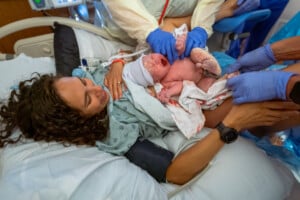IBCLC is an acronym you might not recognize but may come to love as a breastfeeding mom. The letters stand for international board-certified lactation consultant, also known as a lactation specialist certified by the International Board of Lactation Consultant Examiners.1 IBCLCs are experts in all things breastfeeding and lactation.
Breastfeeding isn’t always easy and can be a journey of many challenges, so having an IBCLC on your healthcare team is a fantastic resource. IBCLCs work to help you and your baby have a successful breastfeeding relationship and help you meet your breastfeeding goals.
How Can an IBCLC Help Me?
Lactation consultants, or LCs, support a mother and her baby in various ways. First, they are teachers. LCs play a crucial role in educating mothers about breastfeeding and lactation. They discuss the benefits of breastfeeding and provide education on breastfeeding “techniques.” This might include information on different breastfeeding positions to hold the baby while breastfeeding or what a “good” latch for a baby looks like, the benefits of colostrum, and maintaining your milk supply. Education is continuous when working with an LC, especially if difficulties arise.2
While an LC is teaching, they are also in clinical practice mode. They constantly observe to identify any problems and help prevent them when possible. Being observed might sound intimidating, but please don’t let it be! LCs watch so they can help you succeed in meeting your breastfeeding goals. Typical observations include watching your baby’s latch, the breastfeeding position, the baby’s cues that they are done feeding, or even whether the mom’s nipples are sore or irritated. They will help identify what might cause difficulties, such as pain when your baby feeds or how frequently you bring your baby to the breast. Seeing the whole picture helps an LC help mom and baby. After an LC observes, they can intervene and address problems.2
This process could be answering a question or explaining a new breastfeeding position that might help. Maybe the mom needs to be shown how to get her baby on the breast better for a “good” latch. LCs may even identify more complex needs, requiring them to refer you to your pediatrician for evaluation or referral to a specialist. This may sound alarming, but please don’t let it scare you. This is all done in the best interests of mom and baby to give them all the support they need.2
Where Can I Find an IBCLC?
IBCLCs work in a variety of settings. You will most commonly see them in direct patient care settings, but many practice behind the scenes. You might see one after delivery while you are still in the hospital, at your first pediatrician’s visit, or possibly at home through a private practice. Many hospitals offer breastfeeding support groups run by IBCLCs, which are great places to get help and meet other moms at the same stage as you.
Some IBCLCs may also work on breastfeeding policies, research, and educate other IBCLCs in the field.9 No matter where you see an IBCLC, they will be a resource ready to help address all your breastfeeding questions and concerns.
Training Requirements
To become an IBCLC, you first must complete the education requirements. To sit for the IBCLC examination, you must take 14 health science subjects and have a minimum of 95 lactation-specific hours. That includes five hours focused on communication skills. During this period, you will also determine which pathway you will follow because each has different requirements for your certification examination.3 Let’s break these pathways down:
Pathway 1
Pathway 1 is for health professionals and breastfeeding support counselors practicing through a recognized organization. An example is a registered nurse who works in a mother-baby unit or another setting who frequently helps mothers with breastfeeding support. There are 1,000 hours of lactation-specific clinical experience in a supervised environment required.4
Pathway 2
Pathway 2 is for those who have completed a human lactation and breastfeeding academic program accredited by the Commission of Accreditation of Allied Health Education Programs. You can complete these programs through a college or university that offers clinical experience and health science education. This pathway is more common for those not already in the healthcare field. There are 300 hours of lactation-specific supervised clinical experience required.5
Pathway 3
Pathway 3 requires mentorship with an IBCLC. This pathway needs verified approval before starting clinical experience. During clinical hours, the mentee goes through three phases: observation by the IBCLC mentor, transition into clinical practice with guidance from the IBCLC mentor, and finally, supervised independent practice. There are 500 hours of supervised lactation-specific clinical experience required.6,7
In all three pathways, you must obtain requirements within five years from the time you sit for the exam. It will be essential to keep a detailed record of your clinical hours in preparation for your IBCLC examination.
IBCLC Examination
The final step in obtaining your IBCLC certification is to sit for—and pass—the exam. The exam has two parts and consists of 175 multiple-choice questions. To be eligible for the exam, you must meet all requirements in your chosen pathway. Once completed, sign up through the IBLCE website here, where the instructions are for how to apply for the exam.3
CLC vs. IBCLC
In the lactation consultant world, you may encounter another unfamiliar term: CLC. The acronym stands for certified lactation counselor. Both IBCLCs and CLCs are knowledgeable in breastfeeding and lactation, and their goal is to maintain and support the breastfeeding relationship between mom and baby.
Differences between an IBCLC and CLC include the prerequisites, training, and clinical experience required. CLCs do not have to have a specific educational background to train. They can come from a healthcare profession, or they may be mothers interested in furthering their breastfeeding education and want to support other mothers. CLCs undergo education and classroom training, and the education requirement for certification is 52 hours. After meeting the requirements, the student takes and passes an examination to prove competency and obtain certification.8
An IBCLC is a fantastic addition to your healthcare team, especially during the start of your breastfeeding journey. They offer support for you and your baby and can address any concerns. Being an IBCLC is gratifying for those passionate about helping breastfeeding mothers.





























